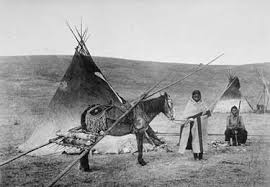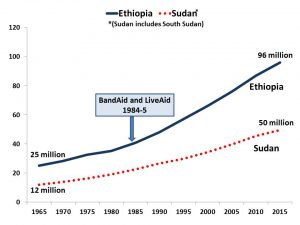(Friday/weekend blog)
Well, there’s a pretty provocative blog title for you.
How to start today’s blog? Hmmm?
Why didn’t American Indians use the wheel?
Let’s start in the USA. We know that American Indians had the ideal conditions for using wheeled vehicles of some sort. They constantly moved camp to follow their major food sources – usually bison (I imagine). And they had plenty of horses to pull wheeled vehicles. Yet for some reason, American Indians never worked out that pulling something on wheels would be rather more efficient and productive than dragging something along behind their horses:
How about Africans?
If you watch daytime TV, you’ll have been bombarded by begging ads from the (IMVHO) overpaid, over-pensioned, self-serving big bosses at charities like Water Aid.
Invariably these ads feature children walking for miles to fetch stinking, stagnant, polluted water which they carry on their backs or heads:
If I was a nasty, racist cynic, I would probably suggest that if this had been Britain many thousands of years ago, four or five things would have happened:
- The men of the village would have got together to discuss the water availability problem
- They would have realised that a wheeled vehicle would be much more effective at carrying water to the village than sending small children to carry it
- They would have designed some kind of cart or other wheeled vehicle to carry the water
- They would have put together teams to collect the water probably even organising some kind of rota whereby every household with an able-bodied person took their turn in getting water for the village
- Or else, they might even have thought about moving the village to where there actually was water
But a nasty, racist cynic might suggest that as this is Africa:
- The men of the village spend all day sitting around on their arses doing absolutely nothing except chewing khat or some other crap and producing ever more children they can’t afford to feed, clothe or educate
- The women do all the work on the subsistence farm and in the home
- Nobody has the brains or the motivational initiative to imagine a better way of getting water
- Nobody has the IQ required to consider the wheel and put it to use to fetch water even though us evil colonialists brought wheeled vehicles to Africa hundreds of years ago
- Nobody would ever have the brains or initiative to think of moving the village to where there was available water
But I’m not a nasty, racist cynic and therefore I would never dream of suggesting any of the above.
But it us remarkable that the Egyptians used wheeled vehicles thousands of years ago with chariots and probably to move material to build the pyramids and Sphynx and statues:
Yet the technology of using wheels didn’t (from the little I understand) spread further south.
So, back to the question – “Would Africans ever have discovered the wheel?” – due to the need to be politically-correct, I have no opinions on the matter or any other matter that could in any way be upsetting for the woke, virtue-signalling, free-speech-loathing, West-hating, self-regarding, pig-ignorant, narcissistic fascists who increasingly control what can and cannot be said and written in Britain
African bungee-jumping?
(Warning satirical content! Warning satirical content! Warning satirical content!)
Anyway, to cheer us all up here are some of Africa’s most highly-educated engineering students testing a bungee jump they have just designed.
As you’ll see, there are a couple of small teething problems still to be sorted:
https://www.kaotic.com/video/1b412a20_20200719170645_t
Are you wasting your money on Water Aid?
And while we’re on the subject of Water Aid, here are some possibly inconvenient truths:
From what I can see Water Aid raises and spends about �82m a year, has 806 staff and its chief executive gets a remuneration package of �148,204 (salary of �134,123 and pension contribution of �14,081). Just to put this into some context, I think the newish big boss of Oxfam gets a salary of about �120,000.�One might wonder why Water Aid�s chief executive should get bigger salary than the chief executive of Oxfam which has a budget (�434m) five times as large as Water Aid’s and over 5,100 employees compared to Water Aid�s 806 employees.
Who gets the money?
Of the �82m a year we give to Water Aid, around �60m theoretically reaches the Third-world poor and the other �20m goes on fundraising and managerial and administrative support. So, about �7.50 of every �10 raised supposedly goes to providing water and sanitation.
The largest recipients of Water Aid�s (our?) money are Mozambique, Tanzania, Burkina Faso and Ethiopia. I have a feeling that the current Water Aid ad campaign is filmed in Ethiopia. But I�m not sure and don’t really care.
I�m sure we�d all agree that these four countries are pretty poor. Or are they?
Let�s have a look at supposedly poverty-stricken Ethiopia. The five richest Ethiopians are worth over $20bn. And�there are now at least 15 billionaires in Ethiopia and an estimated 4,700 millionaires.
It would seem that the Ethiopian elites have more than enough money to provide clean water and sanitation for all their people without Water Aid�s help and our money!
And anyway, the Ethiopians manage to keep reproducing at an extraordinary rate despite their grinding poverty. So things can’t be quite as tough there as the bleating charities keep claiming:
There are about 100 million Ethiopians now. By 2050 there will probably be over 250 million. By the end of this century there might be over 500 million – more than the population of the EU. I suspect you’ll find similar situations in every other country where Water Aid and similar charities claim the people need our money – explosive population growth, massive wealth for the corrupt, aid-looting, kleptocrat elites, appalling poverty for the ever-increasing, baby-producing masses and a comfortable, well-paid, tax-free life for the charity do-gooders.
These countries need birth control and a reduction in corruption, NOT ever more of our money!
Time to stop wasting our money on Water Aid? Time to stop wasting our money on Africa?


















I think all foreign aid should only be on a ” need ” basis, not virtue signaling percentage of GDP.
I wonder if China’s rocket will reach mars ?
British taxpayers will surely be hoping that China’s rocket will reach Mars given that our foreign aid budget seems to have been used to pay for it.
No aid at all. Let them learn for themselves the consequences of stupidity. I am sick of giving aid to stupid people.
I�m not sure that I agree with you today and I am feeling too lazy to do a bit of research.
Recently, I was reading Thomas Sowell and he claimed that the Americas did not have horses or any animals capable of carrying heavy loads and this is why there was little movement of people, plus the fact that movement north-south is through different climate zones and the crops are not the same. (I�m not sure about the horses, a quick check now revealed different views.) In Eurasia we moved east-west and had horses. But he was discussing this in relation to different cultures and diversity. He made the point that when two cultures came together in the past the ideas of the more advanced culture were adopted and therefore they spread through the continent. The wheel was not invented in Britain either, and this applies to many things – ideas travelled with people. He claimed that in the Americas people did not have the means to travel, and in Europe we did not travel very far into Africa. He discusses this in relation to the emphasis on diversity today which he believes is a form of oppression aimed at holding back certain cultures and it is being used by community leaders to gain power and control and he quotes Obama in that context. Sowell is a black American.
Surely, suggesting that Africa needs the wheel to transport water is wrong. They need pipelines and electricity. It is poverty and corruption that is holding back Africa, not the lack of a wheel. This is why the world emphasis on climate control is bad for Africa. They need cheap energy to advance and the only source of that is coal. The western governments have stopped any chance of Africa getting out of poverty by these policies. It is not just water, it is poor health care that is a problem in Africa. Africa need investment, not charity and that will never happen because of the corrupt governments. It has huge natural resources and should have made more progress and now China is buying up all the resources, presumably to conserve their own.
As A Thorpe says, they need pipelines and electricity. Hopefully the Stirling Engine I’m designing, which will pump water and provide a small electrical supply (all from being placed on an open fire), will help to free villagers from these daily chores. Also, by providing lots of individual sources of local power, reliance on the usually corrupt state & its officials will be reduced.
I do not donate to any “charity” which retains more than a few %, especially those with highly paid bosses. And that �7.50 left from the �10 becomes approximately 99p by the time all the officials have taken their cut.
Of course, wheels work best on hard, smooth, flat surfaces. In earlier times (as the Romans demonstrated) wheeels were only useful on roads. Sand, rocks, beaches, forests, bogs, rivers, snow, ice etc, are inimical to wheeled transport. I have always wondered how the stones for Stonehenge were transported from Wales. There is presently no decent theory.
American Indians, as they used to be called, were a nomadic, stone-age people. They relied on wild animals – Bison and deer – for most of their food, housing, and clothing needs, and annually migrated with the seasons to follow the animals they depended upon. They made what few tools and weapons they had developed from wood, animal bones, and stones. They could not smelt Iron, they had not domesticated any animals, and grew only Maize as a primitive crop. They had no settled system of government apart from the best hunters and fighters being acknowledged as community leaders. The horse is not native to the Americas; imported originally by the Spanish, strays became herds that drifted northwards, and the American Indians began to use them from about 1650. Before they had acquired equitation skills, hunting animals for food was a daily, often perilous, struggle on foot; afterwards, a man could hunt enough in a day on horseback to last for a month. North American Indians possessed no written language before contact with Europeans.
Sub-Saharan Bantu Africans were an Iron-Age people who drifted slowly down the continent of Africa from the north, over a period of several thousand years. They finally collided with Boer settlers and bushmen in the valley of the Great Fish River around 1770. They could smelt enough iron for their needs, they kept domesticated cattle. and grew crops with the aid of primitive self-manufactured implement., The numerous individual clans possessed a settled form of government, but they had no written languages. They only moved when the ground a hut village was built on had become too fouled. To quote Donald R Morris from his excellent book ‘The Washing Of The Spears’, ”They were an aimless people, happy and careless, with little sense of time and less of purpose. They lacked written records, wheels, horses, trade mechanisms, and all forms of machinery.”
Unfortunately, as a general rule neither race of people appear to have been sufficiently able to cope with the complexities of the post-Imperial demands that Western civilisation imposes upon them. Hence the huge and probably insoluble problems that we now face.
Thanks for all the instructive comments. But they still don’t answer the question – “Why are all the children in Water Aid ads carrying water instead of the adults devising some wheel-based vehicle to fetch water for the village?”
Having small children carry water containers on their backs or on their heads just doesn’t seem like the most efficient or intelligent way of getting water.
I knew a primary school teacher several decades ago who after retirement in the UK went out to Africa to head up a school there. I was told that although the Africans were in the main amiable people, hard-working in their own fashion, they were hopeless in that, Foreign Aid having provided them with various wheeled vehicles and constructed roads, they used the vehicles until they ceased to function from lack of basic maintenance, then quite happily abandoned them to rot at the roadside. The former mode of transport, Shank’s Pony, was resumed without evident regret. Roads, being unused, started to crack, became invested with weeds, then crumbled and eventually disappeared. The only hope for Ethiopia and the rest of the African continent is education, and that means birth control. To say otherwise is fallacious. It seems non of the NGOs are particularly eager to push the issue of limiting the numbers of children born. To do so effectively would presumably bring about the demise of their lucrative occupations. They would evidently prefer to see the poor little things born into extreme poverty or actual starvation.
Completely ridiculous to discuss progress in Africa and overlook Wakanda.
Surely it would be very cost effective for African males to be paid generously for having ‘the snip’ after having modestly passed on their genes. Doctors Without Borders would be well placed to administer this but DWB seem more than happy to let the current situation proceed. (I know that this is a very stupid suggestion!)
Some years ago I was holidaying on the canals and shared locks amicably with a Canadian couple the husband of which worked for MSF as it was then. In casual conversation I innocently let it out that I thought there was no way that the world would support a population of 7 billion plus. I will never forget the shock and anger that evinced and they carried on through the other locks on their own!
I’m surprised they didn’t torpedo or ram your barge for expressing politically-incorrect opinions.
David, what happens in real life and what is shown in charity ads may not be the same. It is a perfect project for Harry and Megan to take on.
The horse was introduced to North and South American by the Spanish, Portuguese and English colonists.
Seeing the horse was one of the reasons that the Aztecs believed that the Spanish were the arrival of gods come to bring about their destruction in accordance with the predictions of their astrologers.
However, the very impressive South American Aztec, Inca and Maya civilisations built huge pyramids and buildings without having developed the wheel from using logs to roll huge building stones into place. Probably due to not having a suitable animal like the horse that could pull vehicles, so they saw no need not to keep using logs.
Anyhow, although the African American has been living in America for centuries, as a people, it has not adapted well to living in a European-style civilisation without having to resort to gang-culture criminality, state aid and ‘affirmative action’ to support its very high percentage of single-mother families.
This proves that culture is a very deep phenomenon that takes very long periods, measured in millennia, to develop from the lowest to the highest levels.
IMO, the following video provides proof of that assertion.
Media Hides This: Look at Riot Aftermath in Chicago, NYC, MN and St. Louis – SHOCKING VIDEO –
All of those cities are run by the Democrats.
The adverts are probably designed to entice suckers to part with their money by making use of the worst situations in Africa. Donkeys and mules are widely used where the poor people don’t have powered vehicles.
I have seen at first hand Africans using detergent to do their washing at water holes, not running rivers, which are also their only source of drinking water.
Eric Legge – “….culture is a very deep phenomenon that takes very long periods, measured in millennia, to develop from the lowest to the highest levels.” Fundamentally the most accurate statement made amongst all the very interesting above contributions. Culturally-based behaviour evolves indeed over millennia. It’s taken the white Europeans of the mainly Northern hemisphere well over 2,000 years to attain our present level of scientific knowledge and what we regard as “civilisation”. The Chinese in their enormous land had a head start on us and haven’t done too badly, the now abandoned practice of female foot-binding and the current repression of freedom of speech and action excepted. The fundamental intellectual ability remains. Asian/Arab culture and knowledge was pretty good until a specific religion, best left unspecified here, set everything on a backward trajectory. Whether Africa will ever pull itself out of its cultural mire remains to be seen. Africans need to want to help themselves and that means co-operating with and learning from whatever aid is offered, not just passively accepting it. Birth control would be an excellent start.
Stillreading�s post excellently sums up the point I was attempting to make about stone-age and iron-age societies.
It should be remembered that after the Romans left Britain, the indigenous inhabitants reverted to their pre-occupation state. They did not maintain the roads and buildings the Romans left them with. The art of building surfaced roads, and of constructing dwellings or fortifications from stone, brick, or concrete, was forgotten for many hundreds of years; the churches and monasteries were the only islands of literacy and learning in the midst of a sea of ignorance; Britain split up into a myriad of competing, warlike Kingdoms � our form of Tribalism.
It took a long time for us to develop the idea that things could actually be changed for the better. It was not until the Renaissance that the Greco-Roman concept of improving one�s own society through education, research, and hard work was, in the meaning of the title of the era, reborn, and began to permeate European societies.
It will probably take sub-Saharan African cultures as long as it did the indigenous inhabitants of Britain to develop the concept of improving themselves by their own efforts. In fact it would often appear that said cultures are actually at the moment reasonably content with their lot, and that it is only the European charities that think that there�s anything wrong with it � I see few demands for actual domestic political and social reform emanating from Africans themselves.
True in every respect Jeffrey Palmer. I deliberately skipped over the hiatus we broadly refer to as the Dark Ages after the fall of the Roman Empire. It must indeed have been a dark time, but as a culture we did nevertheless evolve. We certainly spent a lot of time and effort fighting foreigners and sometimes each other, but after the Norman Invasion – which we assimilated with ease so that they became us – we did produce Geoffrey Chaucer as well as some gloriously illuminated manuscripts, forbidding castles and magnificent Cathedrals which still stand today. Africa, on the other hand, appears to have evolved very little. Left to itself it would, as you imply, simply carry on as it always has done. Too many children, many of those children never reaching adulthood, plus periodic visitations on the population of plague, pestilence and famine when it outgrows its ability adequately to feed itself. Finally, in the context of BLM, the abysmally ignorant protestors need to be informed that the white man did not march into deepest Africa and round up its people to become slaves. Africans themselves did that to neighbouring tribes. All we did – misguided as it may have been when seen from today’s perspective – was to sail to Africa, moor our ships off shore, row into the coastal slave markets and purchase what was for sale.
And Stillreading we were not the first nation or race to be involved and everyone else was at it.To our eternal pride WE were the one nation to reverse the trend AND put our money where our mouth was and attempted,with some success, to eliminate the trade.However,as we well know ,the trade still exists in the modern world and most of it not practised by whites.
But backwards England learned most of it’s ”culture” from the Moors- including bathing regularly.
Also, I think that the ‘African’ Cheddar person/race helped developed ‘Britain’?